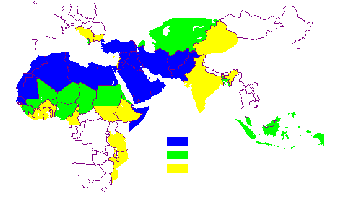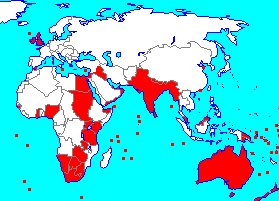In order to evaluate the aftermath of September 11, we first must understand that event. What did al-Qaeda intend to achieve? Only if we understand that can we gauge their success or failure.
From the point of view of al-Qaeda, the Muslim world can and should be united into a single country. They believe that it once had this political unity, under the early caliphs. Even as late as the outbreak of World War I, the Ottoman state ruled much of the Middle East, and the Ottoman sultans had begun making claims to be caliphs (Muslim popes) from about 1880. In the below map, blue indicates heavy Muslim populations, green means medium, and yellow means the Muslims are a significant minority.

From al-Qaeda’s point of view, the political unity of the Muslim world was deliberately destroyed by a one-two punch. First, Western colonial powers invaded Muslim lands and detached them from the Ottoman Empire or other Muslim states. They ruled them brutally as colonies, reducing the people to little more than slaves serving the economic and political interests of the British, French, Russians, etc. France invaded Algeria in 1830. Great Britain took Egypt in 1882 and Iraq in 1917. Russia took the Emirate of Bukhara and other Central Asian territories in the 1860s and forward. Second, they formed these colonies into Western-style nation-states, often small and weak ones, so that the divisive effects of the colonial conquests have lasted. (Look at the British Empire and its imposition on much of the Muslim world, e.g.:)

The Soviet invasion of Afghanistan was not an unprecedented event from the point of view of Bin Laden and his followers. Far from it. It was only the latest in a long series of Western predations in Muslim lands. The British had conquered Palestine, Jordan and Iraq, and had unilaterally opened Palestine to Jewish immigration, with the colonized Palestinians unable to object. The Russians had taken the Caucasus and Chechnya in the early nineteenth century, and had so brutally repressed the Muslims under their rule that they probably killed hundreds of thousands and expelled even more to the Ottoman Empire (now Turkey).
From al-Qaeda’s point of view, the Soviet attempt to absorb Afghanistan was the beginning of the end of the colonial venture. They demonstrated that even a superpower can be forced to withdraw from a Muslim land if sufficient guerrilla pressure is put on it.
Bin Laden sees the Muslim world as continually invaded, divided and weakened by outside forces. Among these is the Americans in Saudi Arabia and the Israelis in geographical Palestine. He repeatedly complained about the occupation of the three holy cities, i.e., Mecca, Medina and Jerusalem.
For al-Qaeda to succeed, it must overthrow the individual nation-states in the Middle East, most of them colonial creations, and unite them into a single, pan-Islamic state. But Ayman al-Zawahiri’s organization, al-Jihad al-Islami, had tried very hard to overthrow the Egyptian state, and was always checked. Al-Zawahiri thought it was because of us backing for Egypt. They believed that the us also keeps Israel dominant in the Levant, and backs Saudi Arabia’s royal family.
Al-Zawahiri then hit upon the idea of attacking the “far enemy” first. That is, since the United States was propping up the governments of Egypt, Israel, Jordan, Saudi Arabia, etc., all of which al-Qaeda wanted to overthrow so as to meld them into a single, Islamic super-state, then it would hit the United States first.
The attack on the World Trade Center was exactly analogous to Pearl Harbor. The Japanese generals had to neutralize the us fleet so that they could sweep into Southeast Asia and appropriate Indonesian petroleum. The us was going to cut off imperial Japan from petroleum, and without fuel the Japanese could not maintain their empire in China and Korea. So they pushed the us out of the way and took an alternative source of petroleum away from the Dutch (which then ruled what later became Indonesia).
Likewise, al-Qaeda was attempting to push the United States out of the Middle East so that Egypt, Jordan, Israel and Saudi Arabia would become more vulnerable to overthrow, lacking a superpower patron. Secondarily, the attack was conceived as revenge on the United States and American Jews for supporting Israel and the severe oppression of the Palestinians. Bin Laden wanted to move the timing of the operation up to spring of 2001 so as to “punish” the Israelis for their actions against the Palestinians in the second Intifadah. Khalid Shaikh Muhammad was mainly driven in planning the attack by his rage at Israel over the Palestinian issue. Another goal is to destroy the us economy, so weakening it that it cannot prevent the emergence of the Islamic superpower.
Al-Qaeda wanted to build enthusiasm for the Islamic superstate among the Muslim populace, to convince ordinary Muslims that the us could be defeated and they did not have to accept the small, largely secular, and powerless Middle Eastern states erected in the wake of colonialism. Jordan’s population, e.g. is 5.6 million. Tunisia, a former French colony, is 10 million, less than Michigan. Most Muslims have been convinced of the naturalness of the nation-state model and are proud of their new nations, however small and weak. Bin Laden had to do a big demonstration project to convince them that another model is possible.
Bin Laden hoped the us would timidly withdraw from the Middle East. But he appears to have been aware that an aggressive us response to 9/11 was entirely possible. In that case, he had a Plan B: al-Qaeda hoped to draw the us into a debilitating guerrilla war in Afghanistan and do to the us military what they had earlier done to the Soviets. Al-Zawahiri’s recent message shows that he still has faith in that strategy.
The us cleverly outfoxed al-Qaeda in Afghanistan, using air power and local Afghan allies (the Northern Alliance) to destroy the Taliban without many American boots on the ground.
Ironically, however, the Bush administration then went on to invade Iraq for no good reason, where Americans faced the kind of wearing guerrilla war they had avoided in Afghanistan.
Al-Qaeda has succeeded in several of its main goals. It had been trying to convince Muslims that the United States wanted to invade Muslim lands, humiliate Muslim men, and rape Muslim women. Most Muslims found this charge hard to accept. The Bush administration’s Iraq invasion, along with the Abu Ghuraib prison torture scandal, was perceived by many Muslims to validate Bin Laden’s wisdom and foresightedness.
After the Iraq War, Bin Laden is more popular than George W. Bush even in a significantly secular Muslim country such as Turkey. This is a bizarre finding, a weird turn of events. Turks didn’t start out with such an attitude. It grew up in reaction against us policies.
It remains to be seen whether the us will be forced out of Iraq the way it was forced out of Iran in 1979. If so, as al-Zawahiri says, that will be a huge victory. A recent opinion poll did find that over 80 percent of Iraqis want an Islamic state. If Iraq goes Islamist, that will be the biggest victory the movement has had since the rise of the Taliban in Afghanistan. An Islamist Iraq might well be able ultimately to form a joint state with Syria, starting the process of the formation of the Islamic superstate of which Bin Laden dreams.
If the Muslim world can find a way to combine the sophisticated intellectuals and engineers of Damascus and Cairo with the oil wealth of the Persian Gulf, it could well emerge as a 21st century superpower.
Bin Laden’s dream of a united Muslim state under a revived caliphate may well be impossible to accomplish. But with the secular Baath gone, it could be one step closer to reality. If you add to the equation the generalized hatred for us policies (both against the Palestinians and in Iraq) among Muslims, that is a major step forward for al-Qaeda. In Saudi Arabia, al-Qaeda has emerged as a dissident political party. Before it had just been a small group of Bin Laden’s personal acolytes in Afghanistan and a handful of other countries.
Although the United States and its Pakistani ally have captured significant numbers of al-Qaeda operatives in Afghanistan and Pakistan, a whole new generation of angry young Muslim men has been produced. Al-Qaeda has moved from being a concrete cell-based terrorist organization to being an ideal and a model, for small local groups in Casablanca, Turkey, Saudi Arabia, Indonesia and elsewhere.
The us is not winning the war on terror. Al-Qaeda also has by no means won. But across a whole range of objectives, al-Qaeda has accomplished more of its goals than the us has of its.
Posted by cds at September 13, 2004 05:02 PM